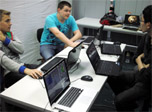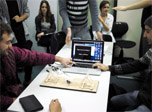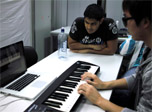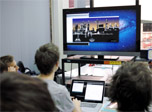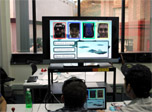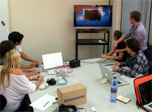Simulated and Immersive Environments 1/3 (2012): Playing on the Edge
Everything gets more interesting, challenging or intense the closer it gets to the edge, and play is no exception. The questions discussed were what is (still) play and what is not (or no longer) play. Several examples that challenge the popular notion of play as harmless waste of time confined to certain times or places were addressed. For instance, the PainStation, professional sports, America's Army, pervasive/mobile gaming and live action role playing (LARP). Huizinga's concept of play was applied to the questions. It was argued that in addition to a number of characteristics that mark an activity as play, play is essentially a subjective perspective and individual decision of the player. Huizinga calls this special attitude the play spirit, which informs a player's actions and is in turn sustained by them. Play needs restrictions to create tension, like an artist's repertoire or an engineering problem. The clear distinction of play and non-play is elementary for play; it is not reducing participation or engagement but, on the contrary, enables them to occur. If there were no borders, nothing meaningful could happen. The boundaries of play do not need to be physical or visible, in fact, they are conceptual in the first place - based on an agreement and understanding the players share. New/digital/mobile games do not challenge this concept, but provide it with a new appearance. They make it more obvious than traditional games that play is a concept, not only an activity. We discussed theory, played (computer and non-computer) games and conceived and realized some games that challenge play using the Processing programming language and Arduino hardware.
Daniel Cermak-Sassenrath. Simulated and Immersive Environments 1/3: Playing on the Edge, Course, Auckland University of Technology, Auckland, 2012, Semester 1. |

